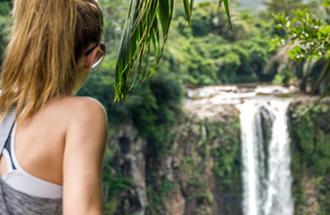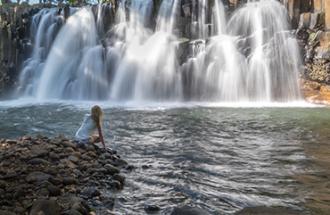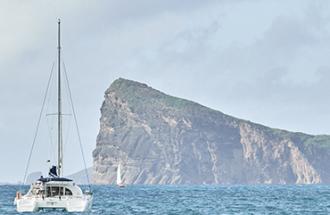Diving in Mauritius
Diving in Mauritius
Discover Mauritius as you would never have imagined it. With stunning underwater sceneries featuring a rich fauna and flora, and numerous wrecks lying on the sand for hundreds of years for some of them, the island offers an extraordinary adventure playground to amateur and professional divers. It is also an opportunity for those who want to embark on this new venture to do so in one of the various diving centres of the island and to enjoy a pleasant water temperature all year round – 22 to 29ºC. You will be amazed by the beautiful corals, multi-coloured fish, dolphins, turtles, and even hammerhead sharks and other sharks… and, if you are lucky, the sperm whales and rays that constantly evolve around the island will honour you with their presence. Get ready for moments of intense emotion!
The sea bed in Mauritius is exceptional because of its characteristic landscape. With an area of 2.3 million square kilometres of territorial waters in the heart of the Indian Ocean, Mauritius rests on the Mascarenes plateau, and is surrounded by a barrier of coral reefs. Diving in Mauritius never starts directly from the beach, all the dives take place in the open sea. The qualified diving teams will take you to the designated spot by boat.
Diving spots
There are numerous diving spots around Mauritius. The experienced divers will choose Gunner’s Coin, the Whale Rock which goes down to 38 meters deep, or Holt’s Rock which descends to 25 meters. Other more accessible sites will be recommended for beginners like the Blue Bay Marine Park in the southeast.
The North
The north of Mauritius features a lot of diving spots, from Pointe aux Piments to Calodyne; more than 65 sites are listed. The northern islets, including the Gunner’s Coin, Round Island, Flat Island and Ilot Gabriel, offer outstanding sceneries with the various landscapes formed by corals, rocks and shallows, and the various and multi-coloured creatures that inhabit them. You will undoubtedly come across sharks who love the area, including the terrible hammerhead shark! Visibility is usually good, this part of the island being relatively protected from the trade winds and very few rivers end their course in the sea there.
The West
More than 45 diving sites are located on the west coast, from Albion to Le Morne in the south. This is the region to watch dolphins and rays. With reefs of 15 to 46 metres deep, strong currents going through basalt tunnels and chimneys, the west coast features a completely different landscape for divers. The sea bed there has fewer coral reefs and more basaltic landforms with changing topographies and highly variable depths.
The East
With some 60 sites listed, this part of the island stretching from Poudre d'Or to Blue Bay in the south will delight divers. Over the centuries, many ships wrecked there. The south-east trade winds and strong currents can be a danger for sailors, but are definitely an exciting challenge for divers. The area swarms with marine species and plankton, and the numerous passes along the reefs provide an easy access to the high seas.
Safety
Diving centres in Mauritius are subject to strict quality and safety controls, all governed by the Mauritius Scuba Diving Association (MSDA), for divers as well as for the protection of the Indian Ocean marine life.
Is it safe diving in Mauritius? The answer is yes, while respecting all the instructions given obviously. Diving centres in Mauritius are affiliated to the Mauritius Diving Association (MSDA) and all professional instructors and divers are licensed and form part of the MSDA. Safety is a priority in this area and strict security and quality monitoring is carried out regularly with the monitors as well as for their equipment.
Diving centres in Mauritius are all affiliated with international diving organizations, including PADI (Professional Association of Diving Instructors), CMAS (World Confederation of Underwater Activities) and SSI (Scuba Schools International) which provide divers with relevant training and certifications.
In case of an accident, a decompression chamber is available at the Victoria Hospital in Candos, next to Quatre-Bornes (tel: +230 427 5131), and can be reached through the DAN network. As health services are not free, tourists should take note that the use of the decompression chamber costs Rs. 10,000 per session, to be settled upfront. Divers requiring care are advised to be accompanied by their instructor or dive leader upon admission at the hospital.
The COVID-19 pandemic is also being addressed and MSDA members are subject to appropriate health controls according to international recommendations, including DAN (Divers Alert Network). The list of approved diving centres is available on the Mauritius Scuba Diving Association page
As important as the human safety, diving centres are committed to environmental protection and follow the guidelines given by the MSDA. Anchoring and manoeuvring procedures have been established and are practised by the diving teams to avoid damaging corals. Since the late 1980s, several actions to rehabilitate the sea bed have been implemented, old boats and trailers have been sunk on the reefs to restore the flora and fauna habitat. Training has also been provided to raise awareness about the importance of not leaving any footprint behind them and not damaging the exceptional underwater life of the Indian Ocean.




